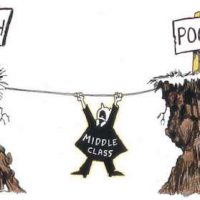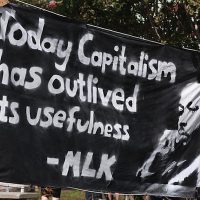-
Amid deep cuts to social programs, Senate approves $700 Billion in military spending
Where were the pundits and elected lawmakers who complain about the cost of providing healthcare to all Americans when the Senate voted to spend $700 billion on the military?
-
We visualized the U.S. nuclear arsenal: It’s not pretty
International security experts often refer to the twin goals of military policy: to minimize the risk of war and to minimize the damage should war start.
-
Trouble in the ministry of truth
Apple has touched off a pretty major row in the halls of marketing. Apparently, the next version of its Safari browser will restrict the creation and retention of “cookies,” which are little computer codes that allow big businesses to collect increasingly rich data, without acknowledgement or permission, on internet users.
-
Work, capital and the ‘administration of punishment’
Criminal justice and welfare policies routinely produce a distinct labour force in Britain, disposable by design. This article examines recent policy developments driving these labour forms, and explores their implications for the meaning of work.
-
The great nutrient collapse
Irakli Loladze is a mathematician by training, but he was in a biology lab when he encountered the puzzle that would change his life. It was in 1998, and Loladze was studying for his Ph.D. at Arizona State University. Against a backdrop of glass containers glowing with bright green algae, a biologist told Loladze and a half-dozen other graduate students that scientists had discovered something mysterious about zooplankton.
-
Racial inequality is hollowing out America’s middle class
America’s middle class is under assault.
-
The significance of Marx’s theory on money
Marx’s theory of money was integral to his analysis of capitalist dynamics. The rich potential of Marx’s analysis of money has, unfortunately, not received the attention it deserves both by political economists and by those who have been inspired by Marx’s political vision.
-
DIY politics in the UK
‘If it ain’t broke, don’t fix it,’ goes the old adage; well it is broke. Over the past two years it has become, for many, overwhelmingly obvious that the mainstream media in the United Kingdom is broke.
-
The fall offensive: the U.S., France and Brazil
The fall of 2017 will witness the most brutal assault on working and middle class living standards since the end of World War II. Three presidents and their congressional allies will ‘revise’ labor legislation, progressive income tax laws and regulations and effectively end the mixed economy in France, the US and Brazil.
-
Pentagon falsifies paperwork to keep Syrian rebels armed with quasi-covert program
On July 19, the Trump administration announced that it would end the CIA’s covert program aimed at arming and training terrorist-linked “moderate rebels” in Syria, sparking hope among some Trump supporters that he was finally enacting the anti-interventionist rhetoric of his campaign.
-
Understanding the native roots of the constitutions of Bolivia and Ecuador
Good Living is a philosophy promoted by Andean governments of South America, pioneered by Evo Morales (Bolivia) and Rafael Correa (Ecuador). It goes back to the roots of ancestral cultures of the region and posits a model for human life in harmony with nature.
-
FARC, the letters mean more now in Colombia
Alternative Communal Revolutionary Forces (FARC). This is the name of the new political party with which former Colombian guerillas are looking to enter the country’s political arena.
-
In month after Charlottesville, papers spent as much time condemning anti-nazis as nazis
Since the Charlottesville attack a month ago, a review of commentary in the six top broadsheet newspapers—the Wall Street Journal, New York Times, USA Today, LA Times, San Jose Mercury News and Washington Post—found virtually equal amounts of condemnation of fascists and anti-fascist protesters.
-
State conservatives block city progressives
Conservative forces, organized by infamous groups like ALEC (American Legislative Exchange Council), are using their influence in state legislatures to pass preemption laws. The purpose is to stop, and even roll back, the gains of progressive local coalitions by usurping the authority of city governments, thereby rendering popular strategies, like ballot and elected official vote measures, useless.
-
Why do we still have employer sanctions?
The AFL-CIO was one of the main supporters of employer sanctions back in 1986. It only took 13 years for the labor federation to learn its lesson: in February 2000 it officially called for the elimination of the policy. Another 17 years have now passed, and the case against the sanctions has only grown more solid.
-
Not a duel, but a duet
Not even the stubbornest non-voters can ignore the coming Election Day in Germany, as always on a Sunday, September 24. With 34 parties, some state or local but most of them national, every stroll offers a wide choice of handsome, smiling candidate photos and bold clichés.
-
Past continuous: Karl Marx’s Capital can help unravel the perplexities of modern-day capitalism
On September 14, it will be exactly 150 years since the publication of Capital: Critique of Political Economy, the first volume of Karl Marx’s epochal Das Kapital. The historicity of the book can be gauged by the fact that this first of three bulky tomes was published by a Hamburg publisher two years after the American Civil War but well above a decade before the incandescent bulb was invented. Capital however, literally acted as the bulb that shone a light on many a way.
-
A question of class: A new class politics, a connective antagonism
Inequality is rising, social divisions are becoming more entrenched, social guarantees once taken for granted have yielded to a generalized culture of insecurity and a common fear of decline.
-
We must have a new Poor People’s Campaign and Moral Revival
Channeling the incisive analysis of our best historians, TaNehisi Coates cut through the talking points of political pundits last week to name Donald Trump America’s “First White president.” Writing for The Atlantic, the National Book Award recipient made clear how there could be no Donald Trump without President Obama. The chaos from which the whole world now suffers is a direct result of the backlash against racial progress in America.
-
Beating the drum for a “good” nuclear war with North Korea
United Nations Ambassador Nikki Haley has proven herself to be one of the most hawkish U.S. representatives to the UN, likely a reflection of the increasingly hawkish veer of the U.S. President Donald Trump, who had originally campaigned on anti-interventionism.




















